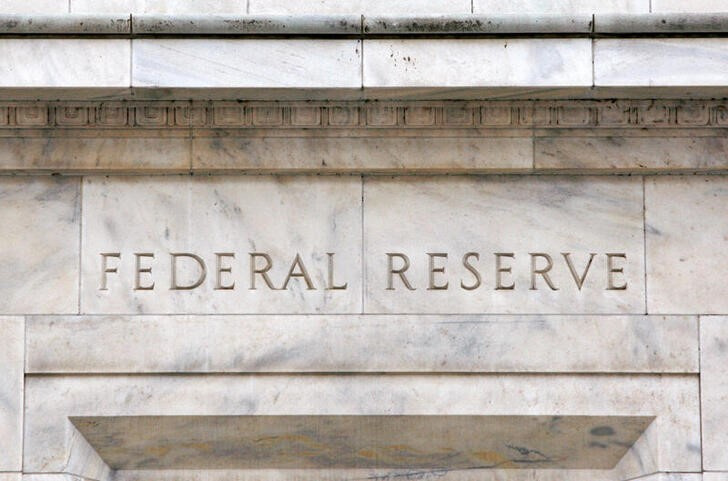By Yasin Ebrahim
Investing.com -- The Federal Reserve cut interest rates by 50 basis points on Wednesday, and lifted forecasts for further rate cuts this year, as the central bank kicks off a rate-cut cycle to shore up the economy following a prolonged battle against surging inflation.
The Federal Open Market Committee, the FOMC, cut its benchmark rate by 50 bps to a range of 4.75% to 5%. The decision wasn't unanimous as Federal Reserve Governor Michelle Bowman preferred to lower rates by just 25bps.
In a sign that voting Fed members are leaning into the rate cutting cycle, Fed members now see the benchmark rate falling to 4.4% this year, suggesting two 25bps rate cuts in 2024, compared with a prior estimate in June for just one cut. In 2025, Fed members see the rates falling to 3.4%, down from a prior forecast for 4.1%, before eventually declining to 2.9% in 2026, down from a prior forecast of 3.1%.
The decision to cut rates for the first time since 2020 followed a years-long battle to quell a rapid rise in core PCE, the Fed’s preferred measure inflation, in the wake of the surging prices during the pandemic.
In the period that followed pandemic, the Fed pushed interest rates to a range of 5% to 5.25%, the highest since 2001, and kept rates in restrictive territory to slow economic growth and curb inflation.
The most recent measure of core PCE for the 12 months through July was 2.6%, down from a peak of 5.4% in March 2022.
"The Committee has gained greater confidence that inflation is moving sustainably toward 2 percent, and judges that the risks to achieving its employment and inflation goals are roughly in balance," the Fed said in its monetary policy statement on Wednesday.
As the Fed made progress on stabilizing inflation toward its 2% target, the central bank shifted focus to its other objective, maximum employment, signaling that it wouldn’t tolerate any further cooling in labor market conditions.
The Fed now sees inflation slowing faster than previously expected. The core personal consumption expenditures price index is forecast to be 2.6% in 2024, down from a prior forecast in June of 2.8%. For 2025, inflation is estimated to be 2.2%, down from 2.3% previously, and slowing further to the 2% target by 2026, unchanged from the prior forecast.
"The new forecasts don’t show inflation returning to the 2% target until ’26, raising questions about how aggressive the Fed will be on incremental cuts going forward. Finally, the terminal rate assumption continues to move up and is closing in on 3%, a hawkish development.," Vital Knowledge said in a Wednesday note.
In the days leading up to the September meeting, the Fed had faced calls to deliver a larger 50bps rate cut amid growing fears that cooling in the labor market was a sign of economic trouble ahead.
Former New York Federal Reserve President Bill Dudley was in the larger rate-cut camp, arguing that the rates were currently 150 to 200 basis points above the neutral rate – a rate that neither supports nor restricts economic growth.
In its latest projections, the Fed lifted its forecast on the neutral rate, to 2.9% from 2.8% previously.
The outlook for deeper cuts come as Fed members are bracing for weakness in the labor market.
For 2024, Fed members sees the unemployment rate at 4.4% for 2024, up from a prior forecast of 4%. The unemployment rate is expected to remain at 4.4% in 2025, up from a prior estimate of 4.2%, and fall to 4.3% in 2026, up from 4.1% previously.
The uptick in the unemployment rate isn't expected to severely dent economic growth, or GDP, which is now forecast at 2% for 2024, down from a prior forecast of 2.1%, and maintain this pace through 2027.
At the press conference that followed the decision, Fed chairman Jerome Powell downplayed concerns about a recession, pointing to solid growth, cooling inflation and a "very solid labor" market.
"I don't see anything in the economy right now that suggests that the likelihood of a downturn is elevated," Powell said. "[Economic] growth at a solid rate, inflation coming down, you see a labor market that's that's still at very solid levels, so I don't really see that [recession risk] now."
Markets swung wildly following the decision, ending slightly below the flatline Wednesday.
As the outsized cut was largely expected, it could spur a "quick and modest pullback," Vital Knowledge said in a recent note, but macro forces including disinflation, resilient growth, monetary easing, and healthy corporate performance "remain supportive of higher prices."
